Following the First World War the British found themselves with new territory carved out of the Ottoman Empire, which included Mandatory Palestine. To help administer this new “mandate” the British formed the Palestine Police Force. It was established on the First of July, 1920 by High Commissioner Herbert Samuel’s civil administration which took over responsibly in Mandatory Palestine from General Allenby’s Occupied Enemy Territory Administration .
This unit was originally made up of 18 British officers supported by 55 Palestinian officers and 1,144 rank and file. Their duties were described as: “Besides fulfilling the ordinary duties of a constabulary, such as the preservation of law and order and the prevention and detection of crime, act as their numbers will allow as escorts for the protection of tax collectors, serve summonses issued by the judicial authorities, distribute Government notices and escort Government treasure throughout the country.”
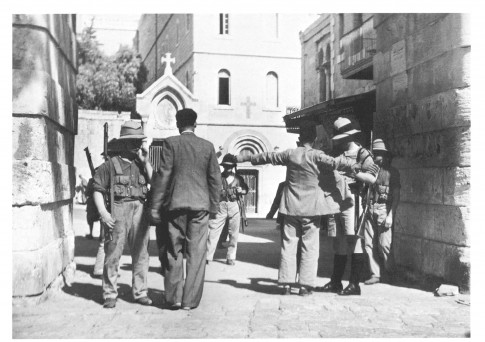
The Palestine Police in Jerusalem in 1936 – note the soldiers wear a variety of uniforms and equipment including the British Wolseley sun helmet (Photo: Private Collection)
The Palestine Police grew in size by 1928 to 2,143 and included 321 Jews, 1293 Muslim Arabs and 471 Christian Arabs. The unit saw action in the 1929 Palestine riots and in the 1936-1939 Arab revolt in Palestine. During World War II the unit became a military force that was eligible for deployment inside of Palestine as well as in Syria and Iraq. In 1944 the Police Mobile Force was created under the command of the Palestine Police and it included the addition of 800 British trained servicemen who had served in Italy and North Africa.
The unit was finally officially disbanded on May 15 with the independence of Israel. Around 1,400 of the active Palestine Police officers (all ranks) were sent to other postings including 500 who established a new Special Constabulary in Malaya.
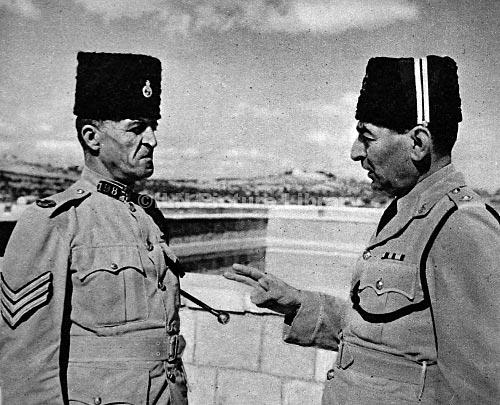
An officer and sergeant of the Palestine Police. These men wear British style tunics and the Ottoman-styled kalpak (Photo: Private Collection)
The Palestine Police was fitted in a variety of British styled tropical uniforms and officers typically wore visor caps, while British and Jewish soldiers wore sun helmets. These were Wolseley pattern helmets – and it appears that the unit was outfitted with pressed felt examples during the wartime years.
The Arab soldiers – both Christian and Muslim alike – were issued with the Arab styled kalpak, the wool hat that was based on Ottoman headdress.
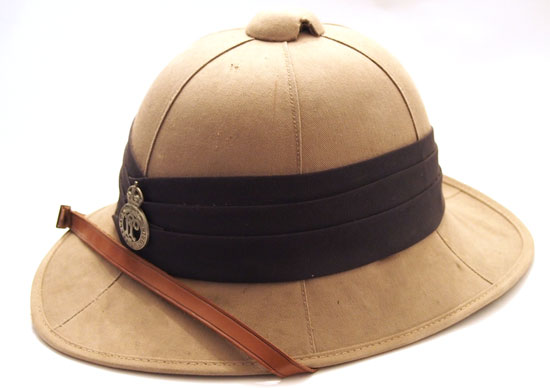
A World War II era British Wolseley sun helmet – dated 1941 and made of pressed felt. It features the three fold puggaree and badge to the Palestine Police (Collection of the Author)
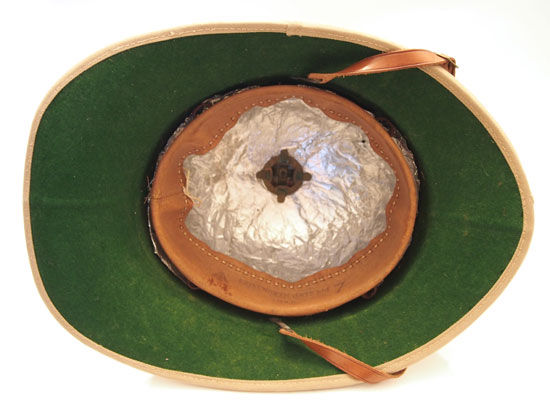
The interior of the Wolseley shows that it was used but not significantly (Collection of the Author)
My friend and colleague Roland Gruschka shared his own story about a helmet he found in 1991 in Portobello Road in London. This helmet came with a tin to E.E. Nott. For a long time Roland believed someone had fixed the ribbon-like blue/black puggaree for decorative reasons.
However, a search on the Marilbruian Club Obituaries provided a bit more information on Mr. Nott-Bower, which revealed: “In 1945 (Nott-Bower) joined The Royal Signals and was commissioned at OTS Mhow, India 1946. He served with 17 Indian Division Meiktilla, Burma and Burma Army Signals before returning to the UK in 1947 for service at Catterick Camp. In 1948 he was posted to the Middle East and served in Jordan, Egypt, Eritrea, Sudan Defence Force as Bimbashi. He was then posted to 7th Armoured Div Signals in BAOR, Germany in 1953. He retired as Captain in 1954.”
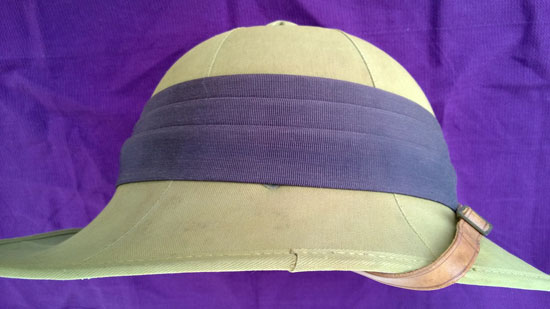
The helmet and tin to “E.E. Nott-Bower” – Royal Engineers — which was purchased with the helmet above. (Collection of Roland Gruschka)
It is possible that Mr. Nott-Bower used his father’s pre-war tin to store/transport his helmet and that he served with the Palestine Police in the final days. It is a mystery that unfortunately is impossible to solve as Mr. Nott-Bower passed away in 2012.
Thank you to Roland for sharing this information.

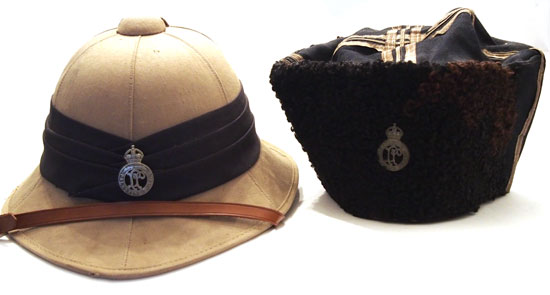
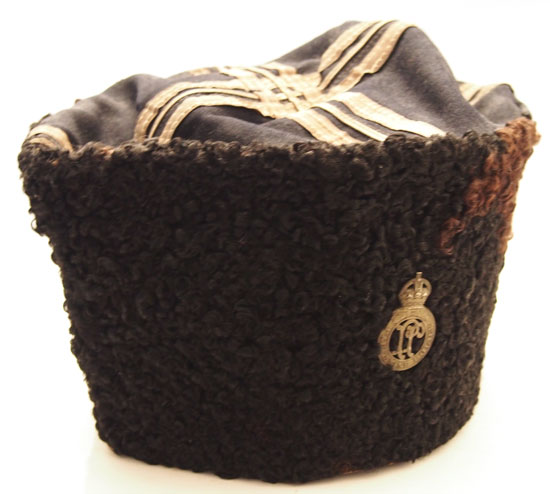
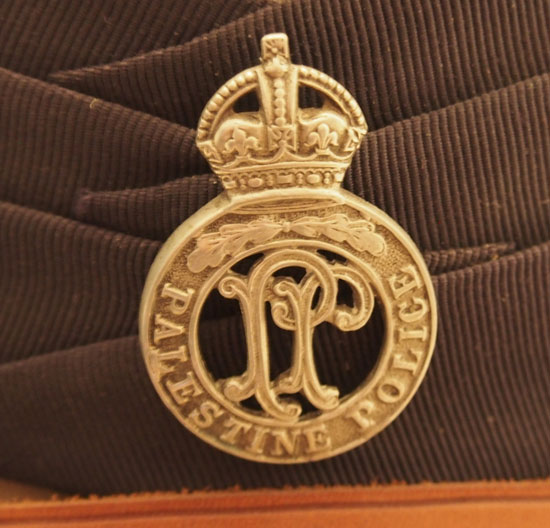
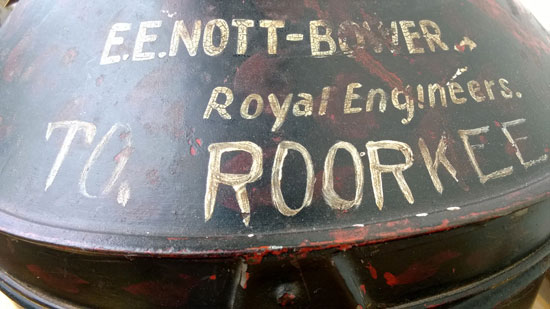
Having recently retired from the US Navy i find myself having more time to read and comment on awesome websites like yours!! Thank you!! You really made todays pirate adventrue worth braving the internet seas!! They say a Smooth sea Never made a Skilled Sailor and im learning fast that those same skills can be applied to the hunt for solid reading material!
Hello there,
E.E. (Elwyn) Nott-Bower was my grandfather on my mother’s side.
I think your history may be subject to some inaccuracies here & there. Elwyn died in 1979 leaving two sons Roger and Colin (as well as two daughters: Margaret, and my mother [Susan] ‘Jilly’). Elwyn was ceratinly a sapper but I thought he had retired from the Army as a Brigadier in 1950… pretty sure this date is metnioned in his book ‘Ten Ton Travel’ but unfortunately I don’t have a copy to hand just now to verify the date. I believe Both Colin and Roger also served in the Army: certainly, Colin was a Major. Roger I know for sure worked in radio communications and later for GCHQ, I think before this he may well have been in the army, so the Nott-Bower referred to has to be Roger. Sadly he died in 2014 so is not around to chuckle over this and comment on where and when he served. Colin is still alive and I will alert him to this page, he’d probably be tickled to discover that the helmet and tin case are not only still existing but also considered of collectable interest!
Best Wishes,
Martin Spencer.